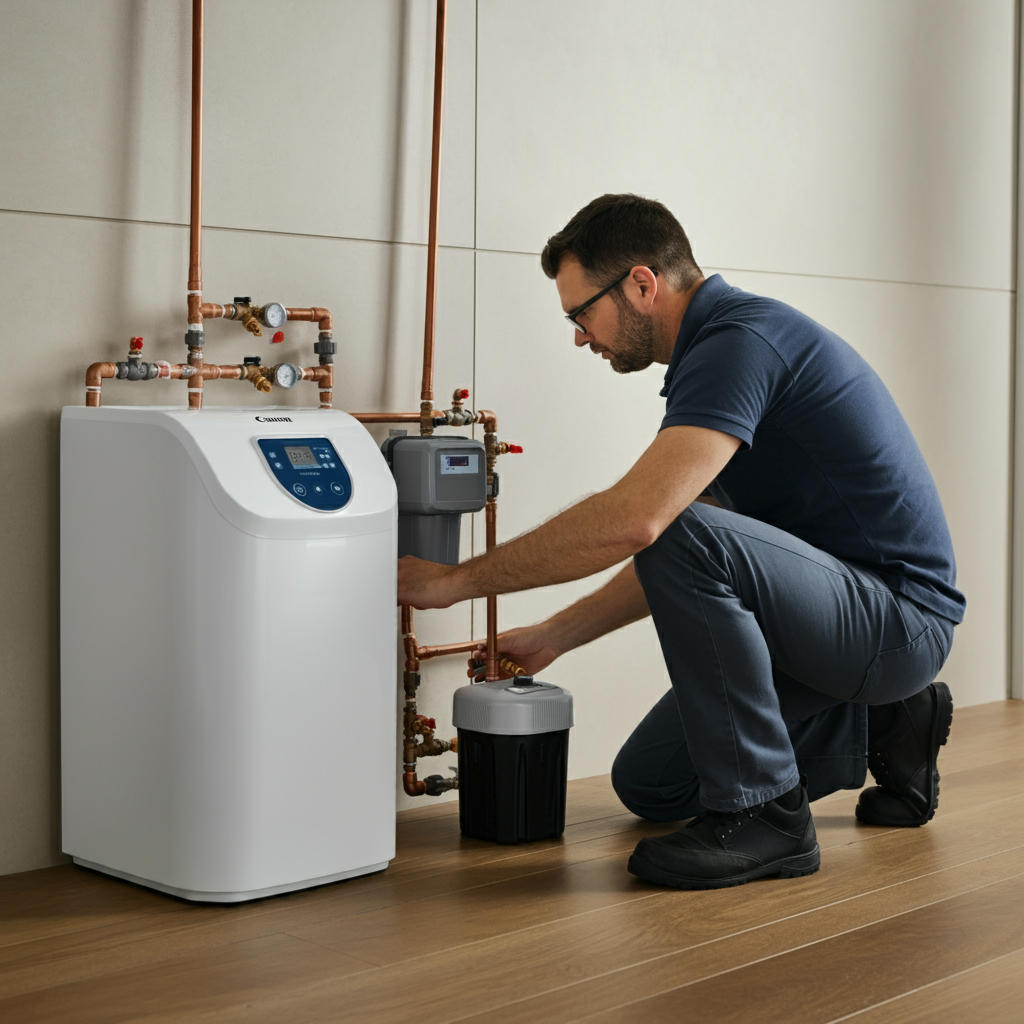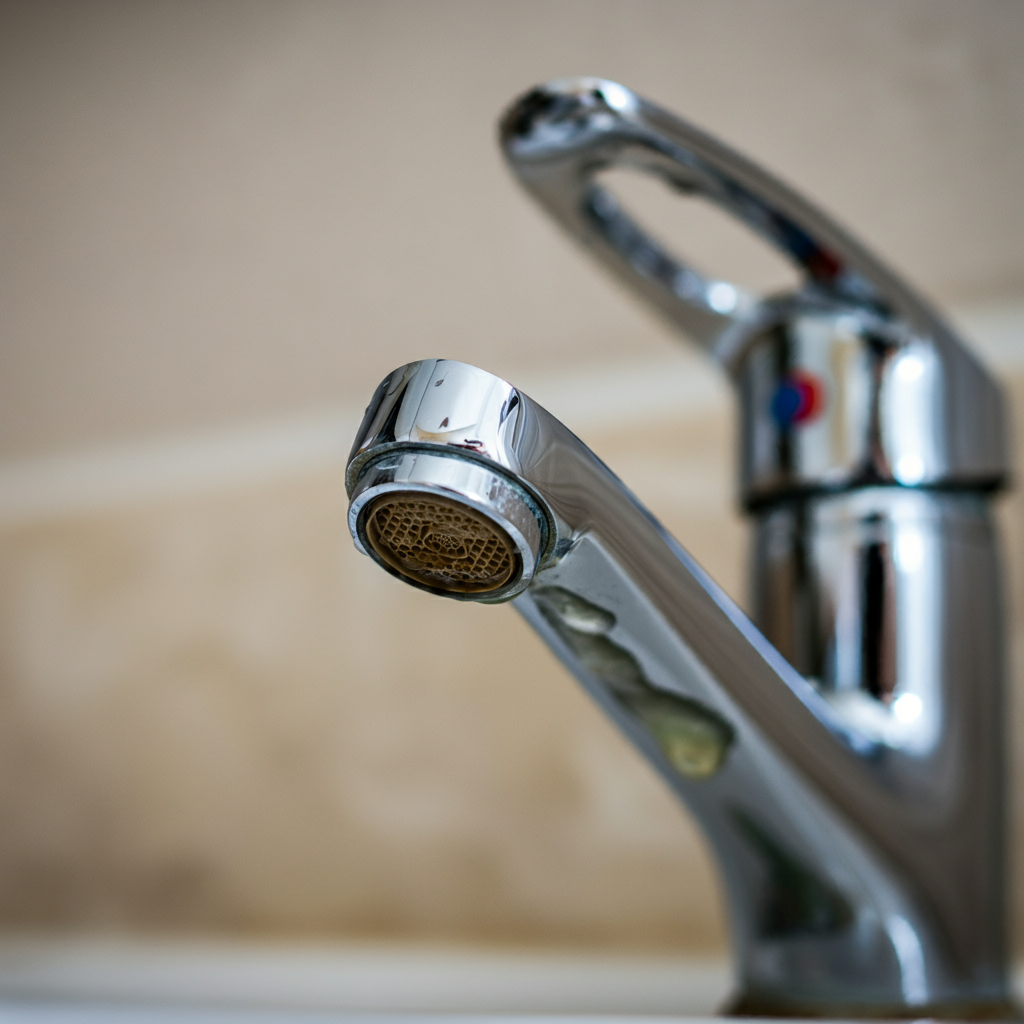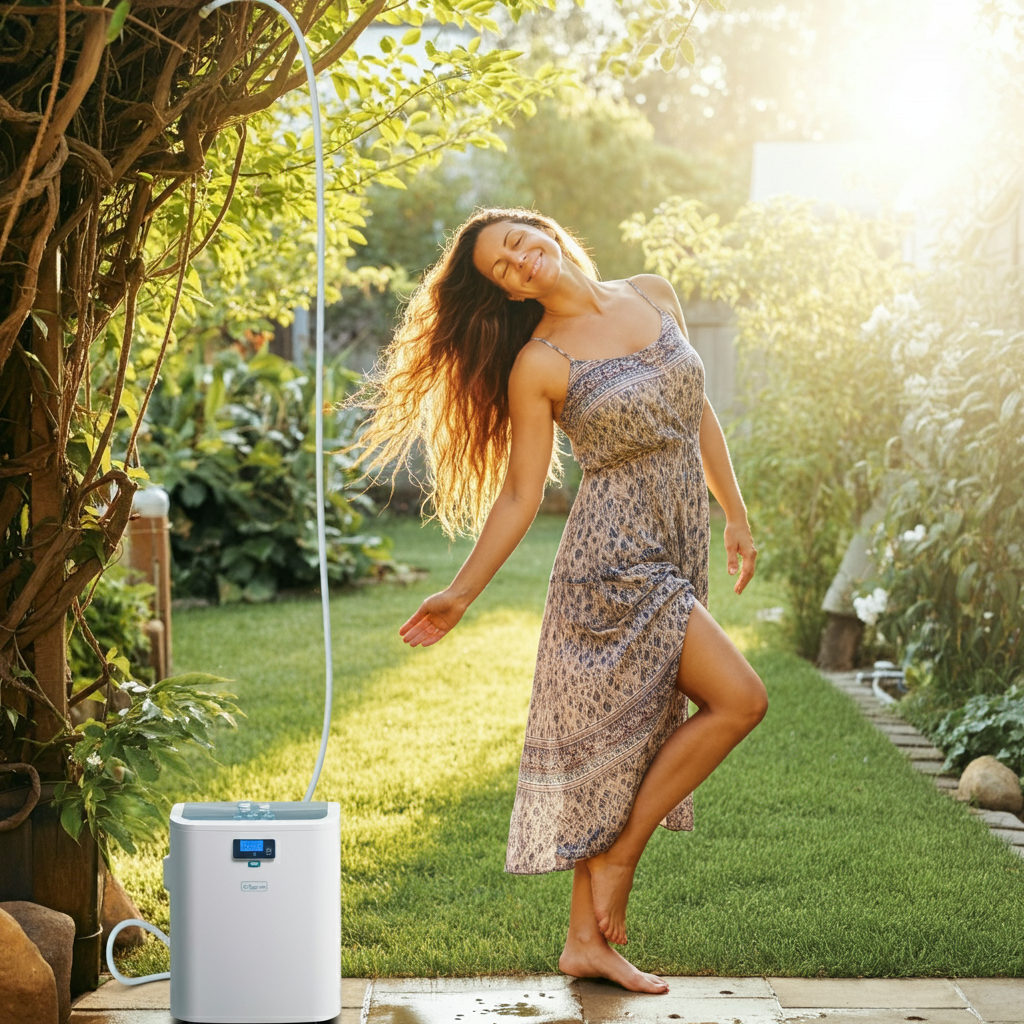Water hardness refers to the amount of dissolved minerals, primarily calcium and magnesium, present in your water supply. It’s a common issue that affects households across the globe, impacting everything from your skin and hair to the lifespan of your appliances and plumbing. At WaterSoftenerSizing.com, we understand the frustrations that hard water can bring, and we’re here to help you understand its implications and find the perfect solution for your home. The level of water hardness directly influences the size of water softener you need. A water softener is a device that removes the excess minerals through a process called ion exchange, replacing them with sodium or potassium ions. Choosing the correct size is crucial for ensuring the softener operates efficiently and effectively softens your water. Too small a unit will regenerate too frequently, wasting salt and water, while an oversized unit may not regenerate often enough, leaving you with untreated hard water. The Water Quality Association (WQA), a leading organization in the water treatment industry, sets standards for water softeners and certifies products that meet their rigorous criteria. The Environmental Protection Agency (EPA) also provides guidelines on water quality, including information on the health effects of hard water and recommended hardness levels. To make an informed decision about your water softener, you’ll need to consider several factors, including your water hardness level (measured in grains per gallon or GPG), daily water usage, and the number of people in your household. We’ll guide you through each of these factors, providing the knowledge and tools you need to choose the optimal water softener size for your specific needs.
Understanding Water Hardness
Water hardness is a common water quality issue that affects households worldwide. Let’s delve deeper into what causes it and how it’s measured.
What Causes Hard Water?
Hard water is formed when water percolates through deposits of limestone, chalk, or gypsum, which are largely made up of calcium and magnesium carbonates. As water passes through these deposits, it dissolves these minerals, carrying them along in the water supply. The more calcium and magnesium in your water, the harder it is. Different regions have varying levels of water hardness depending on the geological makeup of the area. For instance, regions with abundant limestone deposits are more likely to have hard water than areas with granite bedrock. If you’re unsure about your water hardness, you can have it tested by a professional or use a home test kit.
How is Water Hardness Measured?
Water hardness is typically measured in grains per gallon (GPG), although other units like milligrams per liter (mg/L) of calcium carbonate equivalent are also used. One grain per gallon is equivalent to 17.1 milligrams per liter (mg/L). The Water Quality Association (WQA) provides a scale to classify water hardness:
- Soft Water: 0-3 GPG
- Slightly Hard: 3-7 GPG
- Moderately Hard: 7-10.5 GPG
- Hard: 10.5-14 GPG
- Very Hard: 14+ GPG
Understanding your water’s hardness level is essential for several reasons. First, it helps you identify whether you have a hard water problem. Second, it informs you about the potential effects hard water might have on your home and daily life. Most importantly, knowing your water hardness is crucial in determining the right size of water softener for your needs. The Environmental Protection Agency (EPA) sets a recommended maximum hardness level of 8.5 GPG to minimize the negative impacts of hard water on plumbing and appliances. However, even water with lower hardness levels can still cause problems for some households.
The Troublesome Effects of Hard Water
While hard water is generally safe to drink, it can cause a slew of problems in your home that can be both frustrating and costly. Let’s explore the detrimental effects it can have on your household and budget.
In Your Home
Hard water leaves its mark throughout your house, affecting everything from your morning shower to your evening laundry.
- Soap Scum: This sticky, stubborn film forms when soap reacts with the calcium and magnesium in hard water. It clings to bathroom surfaces, leaving behind a dull, grimy residue that’s tough to clean. Soap scum not only makes your shower and tub look dirty but also reduces the effectiveness of soap, requiring you to use more.
- Scale Buildup: This is perhaps the most notorious consequence of hard water. As water evaporates, it leaves behind mineral deposits that accumulate over time. These deposits, known as scale, can clog showerheads, faucets, and pipes, reducing water flow and pressure. Scale buildup in appliances like dishwashers and washing machines can hamper their performance and shorten their lifespan.
- Dry Skin and Hair: The minerals in hard water can strip your skin of its natural oils, leaving it feeling dry, itchy, and irritated. Hard water can also make your hair feel rough, dull, and difficult to manage.
On Your Wallet
Hard water doesn’t just affect the aesthetics and comfort of your home; it can also put a strain on your finances.
- Increased Energy Consumption: A study published in the International Journal of Energy Research found that scale buildup as thin as 1/16th of an inch can decrease the efficiency of water heaters by up to 12%. This means your water heater has to work harder to heat water, leading to increased energy consumption and higher utility bills.
- Appliance Damage: Scale deposits can wreak havoc on your appliances. In dishwashers, scale can accumulate on heating elements, hindering their performance and potentially leading to failure. In washing machines, it can clog valves and hoses, reducing efficiency and causing malfunctions. Replacing or repairing these appliances due to hard water damage can be a significant expense.
- Increased Soap and Detergent Usage: Hard water reduces the effectiveness of soaps and detergents. The minerals react with cleaning agents, preventing them from lathering properly. As a result, you may need to use more soap or detergent to achieve the same level of cleanliness, adding to your household expenses.
How Water Softeners Combat Hard Water
Water softeners provide an effective solution to the pervasive problems caused by hard water. Let’s explore how these systems work and why their size is so crucial.
The Science of Softening
Water softeners operate on the principle of ion exchange. At the heart of a water softener is a mineral tank filled with resin beads. These beads carry a negative charge and attract positively charged ions like calcium (Ca2+) and magnesium (Mg2+) – the culprits behind hard water. As hard water passes through the resin bed, the calcium and magnesium ions are exchanged for sodium (Na+) or potassium (K+) ions, which are loosely attached to the resin beads. This process effectively removes the hardness minerals from the water, leaving you with soft water. It’s important to note that while a water softener primarily addresses the issue of hard water, it doesn’t remove other contaminants like chlorine, bacteria, or heavy metals. For comprehensive water purification, you might consider combining a water softener with other filtration systems, such as reverse osmosis or activated carbon filters.
Why Size Matters
Water softener size, often referred to as capacity, is critical for ensuring effective and efficient water softening. The capacity is measured in grains and represents the amount of hardness minerals a softener can remove before it needs to be regenerated (cleaned). The size of the softener you need depends directly on your water hardness and your household’s water usage. A larger household with high water consumption will require a higher-capacity softener than a smaller household with lower water usage. If your water softener is too small, it will become overwhelmed quickly and require frequent regeneration cycles. This not only wastes water and salt but can also leave you with periods of hard water between regenerations. Conversely, an oversized softener may not regenerate often enough, leading to inefficient salt usage and potentially allowing some hardness minerals to pass through untreated. Understanding this relationship between water hardness and softener size is essential to ensure you choose a system that is properly sized to meet the specific needs of your household.
Determining the Right Water Softener Size for Your Home
Choosing the right water softener size is a crucial step in combating the effects of hard water. At WaterSoftenerSizing.com, we believe in empowering homeowners with the knowledge they need to make informed decisions. Let’s break down the key factors involved in this decision and how you can calculate the appropriate size for your needs.
Key Factors: More Than Just Hardness
While water hardness is the primary factor influencing softener size, it’s not the sole consideration. To ensure your softener functions optimally and provides a continuous supply of softened water, you must also consider:
- Water Hardness (GPG): As we’ve established, the harder your water, the greater the softener capacity you’ll need. For instance, a home with very hard water (14+ GPG) will require a larger softener than a home with moderately hard water (7-10.5 GPG).
- Household Size: The number of people living in your home directly impacts water usage. A larger household will generally use more water, necessitating a softener with a higher capacity to accommodate the increased demand.
- Daily Water Usage (Gallons): This refers to the average amount of water your household consumes each day. You can find this information on your water bill or estimate it using online calculators. Higher water usage demands a larger softener to handle the volume.
Step-by-Step Calculation
- Test Your Water: Begin by determining your water hardness level. You can request a water quality report from your local municipality or purchase a home test kit. Many water softener companies, including some certified by the Water Quality Association (WQA), also offer free water testing services.
- Estimate Daily Water Usage: Check your water bill for average daily usage or use an online calculator to get a good estimate. The average person uses about 80-100 gallons of water per day.
- Calculate Daily Softening Requirement: Multiply your daily water usage (in gallons) by your water hardness level (in GPG). This will give you the daily softening requirement in grains.
- Choose a Softener with Adequate Capacity: Select a water softener with a capacity that slightly exceeds your daily softening requirement. This will provide a buffer for days with higher water usage and ensure your softener can handle peak demand.
For example, if a household of four uses 320 gallons of water per day and has a water hardness level of 10 GPG, their daily softening requirement would be 3,200 grains (320 gallons * 10 GPG). They should choose a softener with a capacity of at least 3,500 grains to accommodate occasional spikes in water usage.
Water Softener Sizing Calculator
To simplify the process, we offer a free, user-friendly water softener sizing calculator on our website. Simply input your water hardness, household size, and estimated daily water usage, and our calculator will instantly recommend the appropriate softener size for your needs.
Expert Guidance from WaterSoftenerSizing.com
At WaterSoftenerSizing.com, we’re more than just a website; we’re your dedicated partners in achieving optimal water quality for your home. Our mission is to empower you with the knowledge and resources you need to overcome the challenges of hard water and enjoy the numerous benefits of soft water.
Our Mission: Your Soft Water Solution
We understand that navigating the world of water softeners can be daunting. With numerous brands, models, and features available, choosing the right system can feel overwhelming. That’s where we come in. Our team of water treatment professionals is committed to simplifying the process and ensuring you invest in a water softener that perfectly aligns with your household’s needs and budget.
What We Offer: Tailored Solutions for Your Home
We go beyond simply providing information. At WaterSoftenerSizing.com, we offer a range of services and resources designed to guide you towards a successful water softening experience:
- Expert Sizing Calculations: Our team utilizes advanced tools and industry-leading methodologies to calculate the precise water softener size required for your specific water hardness level and water usage patterns. This ensures that your softener operates efficiently, maximizes salt efficiency, and consistently delivers soft water throughout your home.
- Personalized Recommendations: We recognize that every household is unique. That’s why we take a personalized approach, considering factors like your family size, specific appliances, and any additional water treatment needs you may have. Our experts will recommend the most suitable water softener models that match your individual requirements and preferences.
- Comprehensive Resources: Our website is a treasure trove of educational resources on water softening. From informative articles and detailed guides to frequently asked questions, we strive to equip you with the knowledge you need to understand the science behind water softening and make informed decisions.
- Partner Network: We have established partnerships with reputable water softener manufacturers and installers. This allows us to offer you access to high-quality products and professional installation services, ensuring a seamless and hassle-free experience.
Why Choose Us: Your Trusted Partner
When it comes to water softening, you deserve accurate information and reliable guidance. Here’s why WaterSoftenerSizing.com stands out:
- Accuracy: Our sizing calculations are meticulous and based on scientific principles, ensuring your water softener performs optimally and consistently delivers soft water.
- Customer-Centric: We prioritize your satisfaction above all else. Our team is dedicated to providing personalized support and guidance throughout the selection process, ensuring you feel confident in your decision.
- Experience: With years of experience in the water treatment industry, our team stays at the forefront of softening technology, bringing you the latest advancements and solutions.
- Results: Our ultimate goal is to help you experience the transformative benefits of soft water. We want you to enjoy softer skin and hair, cleaner clothes, longer-lasting appliances, and reduced plumbing issues.
WaterSoftenerSizing.com is more than just a website; we’re your partners in water softening success. We invite you to explore our resources, utilize our free water softener sizing calculator, and connect with our experts for personalized assistance. Together, we can transform your water quality and enhance your daily life. 
Your Path to Softer Water Starts Here
Water hardness, caused by dissolved minerals like calcium and magnesium, can create a variety of challenges in your home, from unsightly soap scum and scale buildup to dry skin and hair. However, understanding the impact of water hardness and selecting the right water softener size can transform your water quality and significantly improve your daily life. At WaterSoftenerSizing.com, we believe that everyone deserves the benefits of soft water. By following the steps outlined in this guide, you can determine the ideal water softener size for your specific needs, ensuring optimal performance and efficient mineral removal. Remember to consider factors such as your water hardness level, household size, and daily water usage when making your selection. Our free water softener sizing calculator is a valuable tool that can simplify the process and provide personalized recommendations. Additionally, our team of experts is always available to answer your questions and guide you towards the perfect water softening solution for your home. Key Takeaways:
- Water hardness is caused by dissolved minerals, primarily calcium and magnesium.
- Hard water can lead to soap scum, scale buildup, dry skin, and increased appliance wear and tear.
- The size of your water softener should be based on your water hardness level, household size, and daily water usage.
- You can use a water softener sizing calculator or consult with an expert to determine the right size for your home.
- Investing in a properly sized water softener can save you money on energy bills, appliance repairs, and soap usage.
Ready to say goodbye to hard water woes? Visit WaterSoftenerSizing.com today to utilize our free water softener sizing calculator, explore our comprehensive resources, and discover the perfect water softener to transform your water and enhance your home.

Craig “The Water Guy” Phillips is the founder of Quality Water Treatment (QWT) and creator of SoftPro Water Systems.
With over 30 years of experience, Craig has transformed the water treatment industry through his commitment to honest solutions, innovative technology, and customer education.
Known for rejecting high-pressure sales tactics in favor of a consultative approach, Craig leads a family-owned business that serves thousands of households nationwide.
Craig continues to drive innovation in water treatment while maintaining his mission of “transforming water for the betterment of humanity” through transparent pricing, comprehensive customer support, and genuine expertise.
When not developing new water treatment solutions, Craig creates educational content to help homeowners make informed decisions about their water quality.




Thanks for the suggestions you are sharing on this site. Another thing I’d really like to say is that often getting hold of some copies of your credit profile in order to examine accuracy of any detail would be the first measures you have to carry out in credit score improvement. You are looking to thoroughly clean your credit reports from detrimental details errors that mess up your credit score.